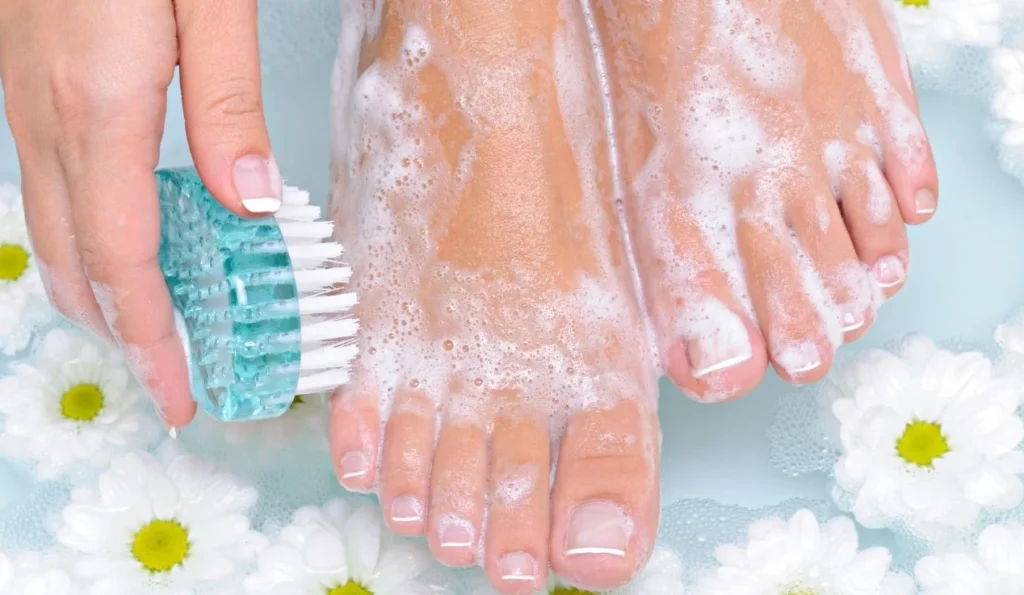Almost every day different people want to know, whether Antibacterial Soap for Feet can be used every day or not. No, it is not necessary to use antibacterial soap for feet every day.
Using antibacterial soap for your feet every day is not necessary and may not be recommended.
While it is important to keep your feet clean and free from bacteria. Daily use of antibacterial soap can disturb your skin’s normal bacterial equilibrium.
The skin on your feet has a protective barrier that consists of beneficial bacteria. It keeps your skin healthy and prevents the growth of dangerous microorganisms.
Regularly using antibacterial soap can eliminate both good and bad bacteria, potentially leading to imbalances and skin issues.
Instead, it’s usually advised to give your feet a regular wash with mild soap and warm water. This will effectively remove dirt and sweat without being too harsh on your skin.
Additionally, make sure to thoroughly dry your feet after washing, especially between the toes, to prevent moisture buildup and the growth of bacteria.
In this article, I am going to share my experience with you. In this post, I will share with me the pros and cons of using antibacterial soaps for feet.
What is the Antibacterial Soap?
A certain kind of soap called antibacterial soap has chemicals that can either kill or stop the growth of bacteria.
It is formulated to provide an extra level of germ-killing power compared to regular soap.
Most antibacterial soaps contain an antimicrobial agent like triclosan or triclocarban as their major active ingredient.

These antibacterial agents work by targeting and disrupting the cell walls or metabolic processes of bacteria, preventing their growth and survival.
Antibacterial soap, when used correctly, can aid in reducing the number of bacteria on the skin and possibly lowering the risk of infection.

Is Antibacterial Soap for Feet everyday use?
While using antibacterial soap for your feet every day may seem like a good idea for maintaining cleanliness, it is not necessary for most individuals.
Regular soap and water are usually sufficient for keeping your feet clean and healthy.
The natural balance of germs on your skin can be upset by using antibacterial soap too frequently, which can cause skin irritation or dryness.
However, there are some circumstances, such as if you have a foot infection or have been exposed to an infectious condition.
Where applying antibacterial soap on your feet might be helpful. Generally speaking, it’s advisable to speak with a healthcare practitioner to identify the best foot care regimen for your particular requirements.
What Are The Benefits of Antibacterial Soap For Feet?
Using antibacterial soap for feet can offer several benefits. Let’s explore them:
1. Preventing Infections
The danger of bacterial infections on the foot can be decreased by using antibacterial soap on a regular basis.
Bacteria thrive in warm and moist environments, and our feet are often subjected to these conditions.
Antibacterial soap can help eliminate bacteria and prevent infections such as athlete’s foot.
2. Reducing Foot Odor
Bacteria are one of the primary causes of foot odor. Utilising antibacterial soap will help you successfully eradicate the bacteria that cause offensive foot odour, keeping your feet fresh and odor-free.
3. Maintaining Foot Health
Antibacterial soap can contribute to maintaining overall foot health. You can lessen your risk of getting illnesses like fungal infections or blisters by keeping bacteria away.

Potential Risks and Concerns
Antibacterial soap has some advantages, but there are also some hazards and issues to consider:
1. Antibiotic Resistance
Frequent use of antibacterial soap may contribute to antibiotic resistance. It may become more difficult to treat infections in the future if germs become resistant due to the overuse of antibacterial drugs.
2. Skin Dryness and Irritation
Some antibacterial soaps could have harsh substances that would deplete the skin of its natural oils, causing dryness and discomfort.
It is crucial to choose a mild antibacterial soap specifically formulated for feet.
Proper Foot Hygiene Practices
Apart from using antibacterial soap, there are other essential foot hygiene practices to incorporate into your routine:
1. Regular Washing
Wash your feet daily with warm water and a mild soap. Ensure thorough cleansing, especially between the toes, and gently pat them dry.
2. Moisturizing
Apply a foot cream or moisturizer to keep the skin on your feet hydrated and prevent dryness and cracking.
3. Nail Care
Trim your toenails regularly, keeping them short and clean. Avoid cutting them too short to prevent ingrown nails.
When to Use Antibacterial Soap for Feet?
Even though antibacterial soap has potential benefits, daily use is not required. Here are some instances when using antibacterial soap for feet is recommended:
- After exposure to communal surfaces like public showers or pools.
- If you have been participating in activities that caused excessive sweating.
- If you have an existing foot infection or are prone to developing infections.
How to Choose the Right Antibacterial Soap?
When selecting an antibacterial soap for feet, consider the following:
- Look for a soap specifically formulated for feet with mild antibacterial properties.
- Pick a soap that doesn’t include any strong chemicals or scents.
- Read reviews and consult professionals to find a reliable and effective product.
Alternatives to Antibacterial Soap
If you prefer to avoid antibacterial soap, there are alternative foot cleansing options available:
Mild Soap
Use a gentle soap without antibacterial properties for regular foot washing.
Natural Remedies
Explore natural ingredients like tea tree oil or apple cider vinegar, known for their antibacterial properties.
Salt Soaks
Soaking your feet in warm water with Epsom salt can help cleanse and soothe.
What is the Best Antibacterial Soap for Feet Used Athlete’s?
The best antibacterial soap for athletes’ feet depends on individual preferences and specific needs.
The best antibacterial soap for treating and preventing athlete’s foot should take into account a few important factors.
Look for a soap that contains antifungal ingredients such as terbinafine, clotrimazole, or miconazole, as these can effectively combat the fungus that causes athlete’s foot.
Additionally, opt for a soap that is gentle on the skin and doesn’t strip away essential moisture, as athletes’ feet are often prone to dryness and irritation.
Popular choices include mild, pH-balanced soaps designed especially for sensitive skin and tea tree oil-based soaps, which have inherent antifungal characteristics.
In the end, it’s critical to pick a soap that works well for you and seek medical advice if you have any worries or recurring problems.
The Importance of Consulting a Professional
It is advised that you see a doctor or podiatrist if you have recurring foot problems or concerns.
They can provide personalized advice and recommend suitable products or treatments for your specific needs.
Why you should stop using most antibacterial soaps
Frequently Asked Questions
Is antibacterial soap good for skin infection?
Yes, antibacterial soap can be good for treating skin infections. The active ingredients in antibacterial soaps, such as benzoyl peroxide or triclosan, can help kill or inhibit the growth of bacteria that cause skin infections.
What is the best soap for smelly feet?
The best soap for smelly feet is one that contains antibacterial and deodorizing properties. Look for a soap specifically designed for foot odour, often labelled as “anti-odour” or “deodorizing” soap. Additionally, soaps containing ingredients like tea tree oil, eucalyptus, or peppermint can help combat odour-causing bacteria and refresh the feet. Experiment with different brands and formulations to find the soap that works best for you in combating smelly feet.
Can I wash my feet with antibacterial soap?
Yes, you can wash your feet with antibacterial soap. It is a suitable option for effectively cleaning your feet, particularly if you want to target and eliminate bacteria or odour-causing germs. Ensure thorough lathering and scrubbing of your feet, including between the toes and around the nails, and rinse with warm water.
Is antibacterial soap the only option for foot hygiene?
No, there are alternative options such as mild soaps, natural remedies, and salt soaks that can be used for foot hygiene.
Can I use regular hand soap for washing my feet?
Yes, regular hand soap can be used for washing your feet, especially if you don’t have any foot infections or concerns.
How often should I wash my feet?
It is recommended to wash your feet daily, particularly after activities that cause excessive sweating or exposure to communal surfaces.
Can antibacterial soap cure existing foot infections?
Antibacterial soap can help prevent foot infections, but it is preferable to get medical advice for the right course of treatment if you already have an infection.
What should I do if I experience skin dryness or irritation from antibacterial soap?
If you experience skin dryness or irritation, consider switching to a milder antibacterial soap specifically formulated for feet or consult a healthcare professional for alternative recommendations.
Conclusion
In conclusion, antibacterial soap can be a useful tool for maintaining good foot hygiene, but daily use is not required.
While it can help prevent infections and reduce foot odour, frequent use may have potential risks such as antibiotic resistance and skin dryness.
Incorporating proper foot hygiene practices and consulting professionals when needed is equally important for maintaining healthy feet.

Hi, I am Karen Paul. Karen’s journey as a Health Soap Technician is marked by continuous learning and a zest for experimenting with skin-nourishing components, and aromatic infusions.
With a wealth of expertise in the art of soap creation and uses, Karen stands as an expert in formulating health-focused soap blends that cater to both body and mind.
Drawing on years of hands-on experience and a keen understanding of natural ingredients, Karen has earned a reputation for her innovative approach to soap-making. Excited to share my experience with you.